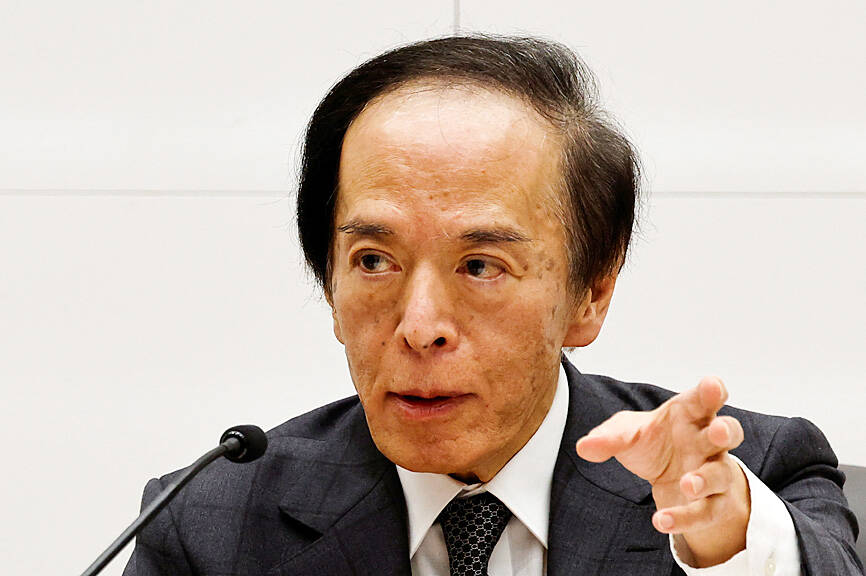Bank of Japan (BOJ) Governor Kazuo Ueda yesterday avoided giving a clear signal that he might raise interest rates next month, reiterating the need to keep monitoring risks for the economy, in comments that nudged down the yen.
“The timing and pace of adjusting the degree of monetary accommodation will depend on developments in economic activity and prices as well as financial conditions going forward,” Ueda said in a speech at a business conference in Tokyo.
“The bank needs to pay due attention to various risk factors at home and abroad, and to examine how these factors will affect the outlook and risks for Japan’s economic activity and prices, and the likelihood of realizing the outlook,” he said.

Photo: Reuters
The speech comes after Ueda indicated last week that the BOJ might wait longer before raising rates, a view that surprised investors expecting move next month if the bank did not act at its meeting this month. The policy stance of US president-elect Donald Trump was among the uncertain factors cited by Ueda at the time.
The governor yesterday continued in that vein. He appeared to want to keep his options open by noting the need to keep rates low to support the economy, while at the same time flagging the risk of maintaining rates at low levels for too long.
“Governor Ueda is keeping his hands free as there are lots of uncertainties including the yen and Trump,” Sompo Institute Plus Inc senior economist Masato Koike said.
“Today’s speech keeps open the chance of a January rate hike, but the likelihood of a March move is probably higher. It’s just too early to commit to a hike or no hike in January,” he said.
The yen weakened to as much as ¥157.37 against the US dollar following Ueda’s comments in Tokyo, from around ¥157.13 at the start of his speech. The move suggested a further recalibration toward a later rate hike among market participants.
As Japan transitions toward achieving stable 2 percent inflation, the BOJ would maintain easy financial conditions by keeping the rate lower than the neutral level to firmly support the economy, Ueda said.
“We have to make sure that Japan’s economy will not return to a deflationary or low-inflation environment,” he said.
The BOJ left its benchmark interest rate at 0.25 percent at this month’s policy meeting. In yesterday’s speech, Ueda said he has a lot to monitor by indicating he wants to see more data to gauge momentum in annual spring wage talks and the outlook for the US economy.
“With regard to Japan’s economy, a key issue in the short run is how the annual spring labor-management wage negotiations will develop,” Ueda said.
The BOJ hiked interest rates in March for the first time in 17 years. Some economists and policymakers feel the nation is ready for its next rate hike, as Japan’s inflation has stayed at or above BOJ’s target for two and a half years, and the economy has continued a moderate recovery.
Still, concern over Japanese Prime Minister Shigeru Ishiba’s minority government securing support for an annual budget might also be among the factors making policymakers at the central bank cautious about raising rates.
A small opposition party that Ishiba hopes would support the ruling party’s budget plans has yet to fully back the initial proposals.
It was Ueda’s last public speech this year. The BOJ board meets again to deliver its next policy decision on Jan. 24.

Intel Corp chief executive officer Lip-Bu Tan (陳立武) is expected to meet with Taiwanese suppliers next month in conjunction with the opening of the Computex Taipei trade show, supply chain sources said on Monday. The visit, the first for Tan to Taiwan since assuming his new post last month, would be aimed at enhancing Intel’s ties with suppliers in Taiwan as he attempts to help turn around the struggling US chipmaker, the sources said. Tan is to hold a banquet to celebrate Intel’s 40-year presence in Taiwan before Computex opens on May 20 and invite dozens of Taiwanese suppliers to exchange views

Application-specific integrated circuit designer Faraday Technology Corp (智原) yesterday said that although revenue this quarter would decline 30 percent from last quarter, it retained its full-year forecast of revenue growth of 100 percent. The company attributed the quarterly drop to a slowdown in customers’ production of chips using Faraday’s advanced packaging technology. The company is still confident about its revenue growth this year, given its strong “design-win” — or the projects it won to help customers design their chips, Faraday president Steve Wang (王國雍) told an online earnings conference. “The design-win this year is better than we expected. We believe we will win

Chizuko Kimura has become the first female sushi chef in the world to win a Michelin star, fulfilling a promise she made to her dying husband to continue his legacy. The 54-year-old Japanese chef regained the Michelin star her late husband, Shunei Kimura, won three years ago for their Sushi Shunei restaurant in Paris. For Shunei Kimura, the star was a dream come true. However, the joy was short-lived. He died from cancer just three months later in June 2022. He was 65. The following year, the restaurant in the heart of Montmartre lost its star rating. Chizuko Kimura insisted that the new star is still down

While China’s leaders use their economic and political might to fight US President Donald Trump’s trade war “to the end,” its army of social media soldiers are embarking on a more humorous campaign online. Trump’s tariff blitz has seen Washington and Beijing impose eye-watering duties on imports from the other, fanning a standoff between the economic superpowers that has sparked global recession fears and sent markets into a tailspin. Trump says his policy is a response to years of being “ripped off” by other countries and aims to bring manufacturing to the US, forcing companies to employ US workers. However, China’s online warriors